The BBC Book List
The Different Book Lists
 1. The Lord Of The Rings by J. R. R. Tolkien (January - February 2005) [Book #35/306]
1. The Lord Of The Rings by J. R. R. Tolkien (January - February 2005) [Book #35/306]
Also on the Observer and My Book lists - Following The Hobbit, I dove headfirst into the tome that was The Lord of the Rings. Although it is often listed as a trilogy of books, my book list treats it as a singular novel, and really that was what it was meant to be. Looking at the detail that Tolkien puts into this world, it is absolutely incredible. For a book that took ten years to write, you can tell. The story is so in depth and the languages that were created so complete that you can almost feel like this is an actual world. Word of advice, I recommend that you read it like I did. Read The Hobbit first, then expand into this book because The Hobbit flows into this book. Also, watching the movies after reading these books gave me so much more insight that upon first viewing I missed. The characterization in these novels is some of the best I have ever read. I love stories that tie back into a whole wider universe. This novel alone had urged me on to explore all of the Tolkien stories tied together, from The Silmarillion to the Lost Stories. If you don't like fantasy novels this might not be for you, but it is dead center of my alley. Overall, the book is fantastic, you just need to read it to appreciate it. Definitely on my must read list.
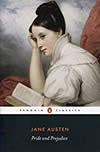 2. Pride and Prejudice by Jane Austen (July 2004) [Book #31/306]
2. Pride and Prejudice by Jane Austen (July 2004) [Book #31/306]
Also on the Sybervision, BBC, and My Book lists - During the early part of the 1800's there was a series series of books written that could generally be classified as romantic time period pieces. Many of these books were written by women who remain as popular today as the day they were written, especially Jane Austen, who is possibly the most famous of them all. The first of Austen's novels that I dove into, Pride and Prejudice, is possibly her best, if not her most famous novel. The story follows the lives of several socialites, all of varying social classes, trying to woo each other. Austen's writing style is full of whit and satire, and although it is incredibly intelligently written it still remains easy to read, a feat many authors fail at. She manages to take a variety of people, all with various attitudes and mannerisms, and involve them in a believable, yet very funny, series of verbal confrontations ranging from topics of marriage, money, and social class. This is definitely a book on my must read list and my favorite of her works.
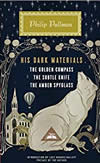 3. His Dark Materials by Philip Pullman (June - July 2006) [Book #48/306]
3. His Dark Materials by Philip Pullman (June - July 2006) [Book #48/306]
Also on My Book list and the first book is on the Observer list - His Dark Materials has quickly become one of my favorite stories of all time. The series is absolutely enthralling, not letting me put it down for a moment. And it is one of the few series I have returned to time and time again. The story can be considered a cross between The Chronicles of Narnia and The Lord of the Rings, where the world building is a bit less in-depth than LotR and much less preachy than Narnia. I find it a cross between the two stories that takes the best of both worlds. The story is about parallel universes, where the primary character, Lira, is a kid with a physical manifestation of her soul literally on her sleeve; or running all around as the case may be. Lira starts out being a very young kid with little worldly experience, who, over the course of the story, grows into the hero the story needs. I have often heard criticism that this series is like the "atheist's bible" or some nonsense like that, and I find that surprising as this book is actually very spiritual. It is very anti-organized religion though and that could be a bit off-putting to some. I found the story to be a well-written and fast-paced read (about 1000 pages in 2 weeks), where in the end all the plot lines got wrapped up neatly. Although, I do disagree with how it ended, but looking back on the story there was really no other way it could have gone. This is obviously a must read for me and one I have often recommended to a lot of people.
 4. The Hitchhiker's Guide To The Galaxy by Douglas Adams (March 2005) [Book #36/306]
4. The Hitchhiker's Guide To The Galaxy by Douglas Adams (March 2005) [Book #36/306]
Also on My Book list - Continuing on my "I'm going to read some "funner" books on this list" trend, I dove into my first outright humorous book. Prior to this I was not much accustomed to "British humor", having not watched much of British comedy shows or movies before. But afterwards I became a convert. I thought this book was absolutely hilarious, and I could not stop laughing through the whole thing. Just thinking about it now makes me want to dive back headlong into it. The plot follows one man, Arthur Dent, as he gets transported off Earth just as it is about to be destroyed. We follow along as he is shuffled around the galaxy just trying to figure out what is going on. I loved this book so much that I continued on through the next four books (making what Adams called "the longest trilogy in the world"). These books also continue the plot-line and are a great fun to read, although the final couple of books in the series start to get a bit bizarre (even more bizarre if you will) and deviate from the original plot-line of the story. This is definitely on my list of books to read, and if you have time, read the entire series.
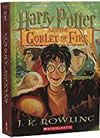 5. Harry Potter And The Goblet Of Fire by JK Rowling (June-July 2019) [Book #154/306]
5. Harry Potter And The Goblet Of Fire by JK Rowling (June-July 2019) [Book #154/306]
Also on My Book list - Harry Potter and the Goblet of Fire is the fourth and final Harry Potter book on my 100 greatest book lists. Up until this point, all of the Harry Potter books have been on the BBC Book list, which was chosen by a UK popularity vote in 2003. This also tells you why some of the other Harry Potter books did not make the cut, since they were not published by that point. Looking at the BBC Book List, the first 21 books have been ranked according to popularity with only one book per author appearing in the top 21. That is the reason books 22, 23, and 24 are all Harry Potter with this book taking the prize at number 5. So, by popular vote, book 4 was chosen as the best of the first four books of the series and I whole heartily agree with them.
Rowling has moved beyond the issues that plagued the first two books and worked this book into a fantastical masterpiece that will survive long into the future. The plot is riveting and the pace of the book is remarkably easy to flow through. The language used helps it to stay in the "teen lit" category but that just means that more people can enjoy it, it is not a knock to the content. The pattern of the novels was also mixed up a bit for this one, where the quidditch matches which were used as the background events helping to propel the finale of the story forward were discarded for an overarching Olympics type event. This tournament resulted in some real stakes for the characters where not everyone was left unscathed. It made the books very suspenseful and very difficult to put down. To top it off I had not seen this movie for several years, perhaps not even since it came out, so the overall plot and the surprise twist at the end completely caught me off guard. Needless to say I loved it and this is by far my favorite of the Harry Potter novels.
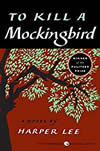 6. To Kill a Mockingbird by Harper Lee (October - November 2015) [Book #132/306]
6. To Kill a Mockingbird by Harper Lee (October - November 2015) [Book #132/306]
Also on the Observer, Sybervision, and My Book lists - Typically, when I am reading one of the books on this list, I am usually thinking of what I am going to say as a review, at least during the last quarter of the book. However, for To Kill a Mockingbird, I had to wait a couple of days until after I finished the book. I had burned through it so quickly, and I'm still having a hard time putting together my thoughts. The book follows the life of a young girl, Scout Finch, living during the depression in a small town in Alabama. As is true with most children, she is inquisitive and playful and the book follows her through her games and exploration of the world around her. She has a mysterious neighbor, who the children are bent on tormenting, even though they have never seen him. An interesting story point that does come to fruition by the end of the story. The main point of the book however is regarded as background material throughout the first portion of the book. This story element, like many in the book, slowly reveals itself through the natural course of storytelling. Scout's father, Atticus, is a lawyer and is charged with defending an African American man accused of raping another man's daughter. How the story manifests itself through the eyes of Scout is truly remarkable. Several times throughout the book I felt myself well up at the sheer impact of the story. I'm not sure if it is because I am father of a young girl and I can place myself in Atticus's shoes at times, or not. But this is truly an emotional novel about race relations during the Great Depression, and how far we had to go at the time. The writing couldn't have been easier to follow, and the descriptions were truly outstanding. Harper Lee's descriptions would often flow through the story, not being placed at any particular point, but would appear as natural eddies in the narrative.This resulted in me flying through the novel, reading half of it in one day. This novel has easily ascended to become one of my favorite books of all time, well within my Top 5 favorites.
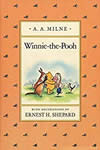 7. Winnie-the-Pooh by AA Milne (July 2006) [Book #51/306]
7. Winnie-the-Pooh by AA Milne (July 2006) [Book #51/306]
Also on My Book list - Winnie-the-Pooh is one of those stories that had pervaded my childhood. From the movies to the cartoon series, I was (and still am) absolutely in love with Pooh Bear, despite never having read the books. And I am sure that the reason this is on the BBC 100 Greatest Books (which is basically a popularity vote on books) is because of the cultural inundation of Pooh. That being said, I still really enjoyed the book. It brought back many good memories from all the movies and shows which took their plots many times directly from the books. The book is set up with each chapter containing a different adventure with Winnie-the-Pooh and his friends in the Hundred Acre Woods. This is how so many books can be created from the one original book. Each chapter is often broken out and made into a unique book, or cartoon, or movie. Within the stories, A.A. Milne talks to the reader in such a unique way that the language he uses could be considered as poor in other instance but in this instance it feels endearing. I found the best stories to be some of his earlier works in the book, which also ended up being some of the shorter chapters. As the chapters/stories got longer, A.A. Milne's particular use of language didn't seem to work as well. However, overall I would definitely recommend this book, especially for the kid in all of us.
 8. 1984 by George Orwell (February-March 2007) [Book #57/306]
8. 1984 by George Orwell (February-March 2007) [Book #57/306]
Also on the Observer, Norwegian, and My Book lists - Out of the four 100 Greatest Books lists, there are only a few books that appear on more than two lists. 1984 is one out of the few on multiple lists and I can understand why. 1984 is a very powerful novel dealing with possible totalitarian future society and how one might survive in such a society. The only problem I really had with this book was the utter hopelessness of it. Through every page, every paragraph of the book, you had this hope that everything may be ok and that everything turn out right in the world again. Unfortunately, after all is said and done, you knew that it wouldn't. Although this is a fascinating book to read it is very depressing but I must say that it is a definite must read, if only to warn people just might be possible. Because, well, you never know.
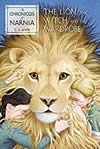 9. The Lion, The Witch And The Wardrobe by CS Lewis (May 2005) [Book #37/306]
9. The Lion, The Witch And The Wardrobe by CS Lewis (May 2005) [Book #37/306]
Also on My Book list - Continuing on through my fantasy kick, I decided to hit up one of the hallmarks of children's literature, The Lion, the Witch and the Wardrobe. However, I like to read stories in chronological order even if they were not originally written in that order, so I started with the first book in The Chronicles of Narnia series (chronologically), The Magician's Nephew. This gave me a different perspective on The Lion, the Witch and the Wardrobe than I'm sure a lot of normally get by only reading that one novel, or reading them in release order. The Magician's Nephew gave me a background on a lot of the features seen within the novel, not the least important being the lamppost. The story of The Lion, the Witch and the Wardrobe follows a group of kids who find themselves in another world by going though a magical wardrobe. Once in this magical land of Narnia, they are drawn into an all out war of good versus evil. Being a "kids book", means that the book is very easy to read (you can breeze right through it) but it is still enjoyable for all ages. My biggest peeve about the book, though is the overarching religious themes. In this original story they aren't as blatant, but as you get into the later Narnia books it becomes pretty oppressive. Definitely on my must read list though.
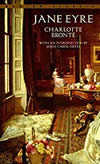 10. Jane Eyre by Charlotte Bronte (December 2003) [Book #21/306]
10. Jane Eyre by Charlotte Bronte (December 2003) [Book #21/306]
Also on the the Observer, BBC, and My Book lists - Continuing on through my grandfather's book collection I noticed there was a large number of books by Jane Austen and the Bronte sisters. And so I decided to sit down and tackle some of those books. It has been so long since I have read Jane Eyre, I feel that I can't do it justice anymore. This is another of the books I need to go back to at some point. Our title character, Jane Eyre, starts off the story at an orphanage and eventually grows up to live with the famous Mr. Rochester. I almost feel like Mr. Rochester is more of a famous character in modern day society than even Jane Eyre is herself. The book is a fun romantic novel with an air of mystery that definitely deserves another go around for me.
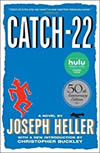 11. Catch-22 by Joseph Heller (July-October 2022) [Book #173/306]
11. Catch-22 by Joseph Heller (July-October 2022) [Book #173/306]
Also on the Observer list - The phrase "Catch-22" has become transcendent from the original novel from which it was sparked but I never fully understood what a "Catch-22" was or how exactly it originated. I knew that it was something that was impossible because of conflicting events. You couldn't do A unless you did B first, but you couldn't do B unless you did A first. So it ends up being something impossible. However, I have now learned what it means in respect to the novel. Catch-22 is a war novel set during the latter days of World War II. In here a "Catch-22" is something that happens in response to a soldier trying to get discharged from the army because they was felt they were mentally unfit, or in essence "crazy". All one had to do was go to the doctor and tell them you were crazy to get discharged. However, if you were able to tell the doctor that you were crazy, then you had to be sane enough to know that, and so you were not in fact crazy and therefore couldn't be discharged. The story of the novel itself plays out much like a M*A*S*H or an F Troop (if anyone still remembers those shows) which are all satirical military stories. Throughout the novel there constantly are incidents and conversations that are downright laugh out loud funny. But as the novel proceeds, you can tell that the tone shifts from humorous to more serious as many of the main characters start to die or be killed off. It is an interesting take on the genre and one that I was fully invested in. At least, at first. As I proceeded through the novel I noticed that the vast majority of the characters were all male, most of whom were white, which would make sense for the time period and setting it was set in. However, all of the women in the story were either prostitutes or treated as such. All of them barely had any dialogue, if any at all, and most of them were treated in the worst ways possible. Sexual assault was treated as a joke while rape and murder were blown off by the local police because the woman didn't matter. The blatant misogyny was a bit overwhelming, but not only that but the complete disregard for women at all in the novel. They were set pieces to be used or abused as needed and then discarded when their time was over. And so while I can understand why this could be considered a great novel of its time, it has not weathered the test of time very well and I can't recommend that people wade into it unless they really want to.
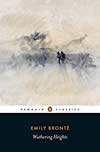 12. Wuthering Heights by Emily Bronte (May 2006) [Book #45/306]
12. Wuthering Heights by Emily Bronte (May 2006) [Book #45/306]
One of the 2 on all 4 of the 100 lists (Observer, Norwegian, Sybervision, and also My Book list) - Wuthering Heights ended up being a very weird book and not at all what I expected. I initially considered this to be one of those "chic lit" books but I couldn't have been more off. This is one of the most depressing books I have read yet. The book explores how Satan himself can sometimes corrupt people into being wretched human beings, but in the end sometimes they are able to pull through. Most of the story takes place as a flashback of one of the former housekeepers. It is a little confusing and not very enjoyable at first because of the erudite language Bronte used, but after a few chapters I got used to it. After the flashback it shows an orphaned child, Heathcliff, brought back to the house and is shunned by everyone. However, Heathcliff eventually takes over everything. Since most of this is known at the start of the story, it is interesting to see how everything comes about and to see how two separate families who differ in everything (intelligence, strength, and health) intermingle. This book is definitely on my must read list and it should be on yours.
13. Birdsong by Sebastian Faulks
14. Rebecca by Daphne Du Maurier
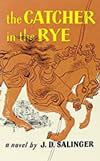 15. Catcher in the Rye by J.D. Salinger (1996ish?) [Book #6/306]
15. Catcher in the Rye by J.D. Salinger (1996ish?) [Book #6/306]
Also on the Observer list - The Catcher in the Rye seems to have been relegated to "cult" status stemming from the obsessive love of the book that Mark David Chapman had for the book. Chapman is well known as being the murderer of the beloved John Lennon. Whether the book deserves this cult status is up for debate but I personally don't understand it. The book is a rather depressing novel about a 16 year-old adolescent, just kicked out of prep school, and learning to deal with the adult world of "phonies." It's a very well written book and really enjoyable to read. However, it has been a long time since I have read the book, so I will place this on my must reread list to hopefully be able to solve this cult classic mystery for myself.
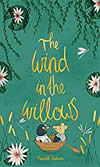 16. The Wind in the Willows by Kenneth Grahame (October - November 2010) [Book #96/306]
16. The Wind in the Willows by Kenneth Grahame (October - November 2010) [Book #96/306]
Also on the Observer list - This is not what I was expecting when I started it. At first I was expecting a kiddy story about a bunch of animals. Well, there was a bunch of animals, but it definitely was not kiddy. The story was very well written, not shying away from the larger, more adult, words when appropriate. The story at times seemed to be about random misadventures of a group of animals, but through the story you can grasp a common thread going through four of them. My main problem with the story is that I felt unfulfilled afterwards. A character like Mole really grew from the beginning of the story, where he was rather naive, to the end, where he was able to stand up for himself and help lead a revolt. Although, a counterpoint to that is the character of Toad, who did not grow at all and actually seemed to devolve through the progress of the story. All through the story I was waiting for him to get his just desserts in the end, however it never came. Even his supposed humbling at the end seemed fake; like he didn't actually feel any remorse over what he had done. So in regards to the Toad story arc, I can't really recommend this book because it was a real disappointment when all was said and done.
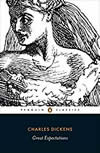 17.Great Expectations by Charles Dickens (2004) [Book #30/306]
17.Great Expectations by Charles Dickens (2004) [Book #30/306]
Also on the Norwegian, Sybervision, and My Book lists - Great Expectations was one of Dickens' last novels, and by far one of his best. The novel follows Pip, a street orphan, as he is saved by a convict and eventually grows up to find love. While reading through the story it can be a bit slow at times but overall the story is well written and easy to follow. This book, along with most of Dickens' other works, also suffers from the eternal optimism that is a hallmark of Dickens writing, however it flows much more easily in this story than in others where it often feels forced. The story tackles many themes including wealth versus the poverty we see Pip start out with, love and rejection, and good versus evil. It is definitely a story with a warm heart at its center, as can be found usually with Dickens.
 18. Little Women by Louisa May Alcott (May - December 2011) [Book #101/306]
18. Little Women by Louisa May Alcott (May - December 2011) [Book #101/306]
Also on the Observer and the Sybervision lists - Typically when Little Women is mentioned, it is often regarded (at least in my mind) as a little girls/ chick lit novel. I had tended to stay away from this book for that very reason and it might have worked out for the better. The way I read it was very slowly, about 10 pages or so a night, to my daughter, over most of the year. In this way I had a chance to grow with the characters as they were growing and watch my daughter grow as well. I become connected to them in a way that doesn't usually happen to me and when one of them died, I really felt the loss. This book was one of the better books I have read in a while and although it would probably still be considered a chick-lit novel, I found the characters very engaging and the writing to be far superior to many books written for the same age-level. As the characters got older, the language in the book also seemed to be getting older, to the point that at the end I didn't know what several of the words even meant, or how to pronounce them. In the end, I would recommend this book, especially as a family read-time book. I had a great time reading it to my daughter and I could feel many families would enjoy a similar experience.
19. Captain Corelli's Mandolin by Louis de Bernieres
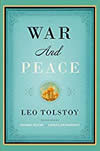 20. War and Peace by Leo Tolstoy (August 2011 - February 2012) [Book #102/306]
20. War and Peace by Leo Tolstoy (August 2011 - February 2012) [Book #102/306]
On the Norwegian, Zane, and the Sybervision lists - This is often mentioned as one of those books known just for being long, and long it is (~1600 pages) but not many people can say what the main story is about. This book follows Napoleon's invasion of Russia during the early 1800's, but most importantly during 1812. My overall impression of War and Peace, is that it feels like a typical Russian novel. In this instance the characters are a little easier to figure out than a typical Russian novel, because he doesn't use as many names for the same character as Dostoevsky often does. Even so, he does has a lot of reoccurring characters. As I think about it now, I'm not sure if all of their story lines were wrapped up by the end of the novel. You forget about some of them, then all of the sudden they return. The story is a historical fiction novel with the characters interacting with historical figures. It actually felt like a history novel because the situations played out so well. I would recommend this book to any history buff interested in the Napoleonic Wars, although I still don't understand why Napoleon was driven from Russian, even now. The book is divided into 4 books, with 2 epilogues, and an appendix. The first epilogue felt so much like the rest of the book that I'm not sure why it was made as an epilogue. It just continued the story on from the previous section. It even has chapters. But the second epilogue is what broke me. After reading this book for 7 months you give me this theoretical musing on the purpose of war and why Napoleon did what he did. It was definitely a drudge to get through and I am convinced he wrote that last section just so people would never finish this book. The second epilogue mimicked the style used for the first one or two chapters of each book but this was just orders of magnitude worse. During the actual story, he would give an overall synopsis of the war, and what Napoleon was thinking, then move right back into the story, but the second epilogue had no place in this book and you would miss nothing by skipping it. Overall, I felt the story was good but I never felt anything for the characters. When they died, I didn't really care. And that about sums up my feelings on this book. It is over and I don't really care.
21. Gone With The Wind by Margaret Mitchell
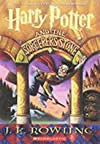 22. Harry Potter And The Philosopher's Stone by JK Rowling (AKA Harry Potter and the Sorcerer's Stone)
22. Harry Potter And The Philosopher's Stone by JK Rowling (AKA Harry Potter and the Sorcerer's Stone)
(May 2019) [Book#148/306]
Harry Potter has been a series that has been sitting in my "to read" pile for over a decade. I waited for all of the movies to come out and then I just didn't have the ambition to tackle a series of that size. Along comes my daughter, who has started reading the series with my wife and so I have been prompted to start it myself. After each book they read, we all watch that movie together. So, before starting this book I have recently watched the first three movies. I don't know if having them fresh in my mind was a good thing but I'm feeling not because for much of this first book I was comparing it to the movie and getting the "well, this isn't that different from the movie, I was hoping for more" type of feeling.
I think my biggest qualm with the book has to be the same qualm I have with the movies, and that is the Dursleys. I don't personally care for that plot, I don't like them as characters, and I feel that part of the story is poorly written. The first two chapters felt like something out of a Roald Dahl playbook, and I'm not a personal fan of his writing style. So after the first two chapters I was not looking forward to much more of this. But I must say, it got much, much better. The pacing throughout the novel seemed very off. The first half of the book was up through Harry getting settled into his first few days of school and then the book takes off, skipping months at a time. I can see how in future books, Rowling would want to expand upon their time in school a bit more, resulting in the books becoming much, much longer. A lot of the scenes within this book also felt rather random, or randomly placed at least. It was like Rowling had all of these plot ideas she wanted to seed into the book but had no really smooth way of introducing them.
Comparing the book to the movie though was a detriment for me. The movie follows the book surprisingly well for about 3/4's of it, and so I was not all that surprised at anything that was happening. I had kept hearing how so many things were different in the books, that it ended up being a bit disappointing for me. But then the differences started shining through. Once the movie takes the slimmed down approach to the book, the book started to come into its own, and I really got a kick out of it. The pacing really picked up in the latter half of the story too. I imagine the latter stories get even better as Rowling figures out her flow through the series and I'm looking forward to seeing how things start to progress. Especially as I get past the movies I have recently seen.
 23. Harry Potter And The Chamber Of Secrets by JK Rowling (May 2019) [Book #149/306]
23. Harry Potter And The Chamber Of Secrets by JK Rowling (May 2019) [Book #149/306]
Harry Potter and the Chamber of Secrets is the second book in the Harry Potter series, and like I said after reading the first book, I have recently watched the movie so this one is fresh on my mind. What truly amazes me about the book-to-movie comparison is how much it feels like the book is copying the movie in this way. The makers of the movies were so spot on in many instances that it feels like the book had to have been rewritten to match what was on the movie screen other than vice-versa. It really threw me off for major chunks of the book. But following up on her astounding first novel we come to book number 2. I have found with this book, Rowling fixes many of the missteps she had in the first book. In the first book it seemed many of the plot points were random, or haphazardly thrown together. Here it is much, much more fluid. There aren't major plot items (like the mirror in the first book) that just appear out of nowhere. They have a flow to them. The passage of time also seems like a much more natural thing, spells take weeks, so weeks pass, and other such changes. It's not all perfect. I felt this book dragged a bit more than the first book. It felt much longer, even though they are roughly the same length. The Dursleys still irritate me to no end. I don't entirely even understand that plot point. Why must Harry keep going back to them? Is there nothing else that can be done? And why does everything that happens to them happen in the world of Roald Dahl? Ugh. But I digress. Overall, the writing style has greatly improved over the first book. Rowling is clearly improving herself over the course of these books and I can't wait to see what comes next. The next book will be the last movie I have seen recently, so after that I hopefully can go in fairly fresh.
 24. Harry Potter And The Prisoner Of Azkaban by JK Rowling ( May 2019) [Book #150/306]
24. Harry Potter And The Prisoner Of Azkaban by JK Rowling ( May 2019) [Book #150/306]
The third book in this seven book series by J.K. Rowling, Harry Potter and the Prisoner of Azkaban is by far my favorite book in the series so far. Typically I like to watch the movies before I read the books, such as for The Lord of the Rings, because more often than not the books are better than the movies. This allows me to continue my enjoyment of the story going from the movie to the book, instead of being disappointed by a movie after having read the book. For the first two books though, I think my biggest problem with the books was that the movies were so close to the books. This made the books feel like a glorified retelling of the movie (from my perspective). There wasn't much extra in the books to make them feel worthwhile to read. So in those instances, I would have to say I actually enjoyed the first two movies better than I did the books.
However, that all changed with this third book. Rowling has continually improved her ability to write these stories with each book and has produced a story that is a tremendous leap forward from Book 2. Her prose is much richer in context and plot, allowing everything to tie together perfectly. She has managed to fill out the story and the world in which they reside gloriously. There are no longer these random plot points. Now we have story threads hinted at in the beginning of the book, and even throughout the book, that don't come to full fruition until the end of the story. She has improved her ability to tell an intricate story to the point that I can see how these books became world-wide phenomenons. I still have issue with the way she handles the Durselys, but I feel like that plot thread has been getting smaller and smaller and hopefully will one day become nonexistent. Overall, this is my favorite of the series so far and it has me excited to jump right in to Book 4.
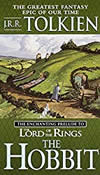 25. The Hobbit by J. R. R. Tolkien (January 2005) [Book #34/306]
25. The Hobbit by J. R. R. Tolkien (January 2005) [Book #34/306]
Since books are notoriously better than their movie counterparts, I wanted to wait until all of the Lord of the Rings films finished up in theaters before starting this series. The third movie was released in December of 2003 and so I could get started on the books at any time. I also like to read books in the order that they were meant to be read, so that meant starting off this series with The Hobbit. Overall, I felt that this was a fantastic book, however it definitely was not as intricate as The Lord of the Rings. The one thing it does do fantastically though is it sets up the events of The Lord of the Rings. The story follows a hobbit names Bilbo Baggins, while he goes off on some adventures with the wizard Gandolf. It definitely feels like a kiddie version of the Lord of the Rings movie/book though and so may be a good stepping stone getting into the series, but for those already accustomed to the movies, this may end up not being what they expect.
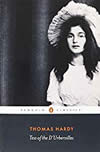 26. Tess of the D'Ubervilles by Thomas Hardy (October 2014) [Book #126/306]
26. Tess of the D'Ubervilles by Thomas Hardy (October 2014) [Book #126/306]
Also on the Sybervision and My Book lists - I am very conflicted with this book. First off, it is very well written and easy to read. This is a definite plus in my book. But rereading the summaries of the other Hardy books I had read so far Far from the Madding Crowd and Return of the Native) I seemed to have similar feelings about them. All of the stories are well written but it is the story itself that I have problems with. First off, this is the best of the three Hardy books so far. But the problem is that Hardy likes to beat down the women in the book until the main character is almost not a character at all, just a plot device to drive the story forward. The story starts off with a peasant family by the name of Durbeyfield finding out they are actually descendants of the "great" house of D'Urberville. This gets them really nothing; however it propels the family forward into trying to get something from it and this is where the trouble starts. Tess is sent to another D'Urberville family thinking they are related, but in actuality they just took the name for prestige and she ends up getting pregnant out of wedlock. Her life is essentially ruined because of this but throughout the book there is a very interesting dynamic as many of the main characters are forced to face the harsh realities of Christian dogma and stigmas of the times. I found the way that the characters reacted to be rather truthful and interesting. Another problem I had was the pacing of the story, where the story would be traveling along and then suddenly something would happen. It was often jarring throughout the story where the big events often felt rather forced. But part of these jarring instances was that the author would repeatedly bring back characters and ideas hinted at earlier in the book to play more pivotal parts later on. I did rather like that approach though. Overall, I would say that the story isn't "great" but it is a pretty good read and made me think a lot, which is not always a bad thing.
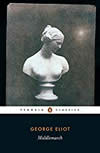 27. Middlemarch by George Eliot (January - March 2008) [Book #71/306]
27. Middlemarch by George Eliot (January - March 2008) [Book #71/306]
Also on the Norwegian, Zane, Sybervision, and My Book lists - I rather enjoyed Middlemarch. It started off slow, but as the book went on it picked up its pace rather well. Although the book was the longest I have yet read on this list, about 900 pages, the plot was simple enough that it was easy to follow throughout the entire book. Middlemarch is a town in England where the book follows the lives of the families living there, mainly two different families and their daughters. The book also delves into a lot of conflicts including doctors versus faith, modern medicine versus traditional medicine, and similar subjects. When I started reading the book I had a brief period where I needed to get used to the language being used but it didn't take me very long and afterwards I could easily understand what was going on. I can easily recommend this book as a great story with good lessons, if you are willing to take the time to read it.
28. A Prayer For Owen Meany by John Irving
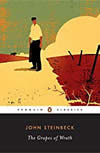 29. The Grapes of Wrath by John Steinbeck (August 2015) [Book #130/306]
29. The Grapes of Wrath by John Steinbeck (August 2015) [Book #130/306]
Also on the Sybervision and My Book lists - Often, when I start out reading a book, I set goals for myself, such as 10 pages a day, or a chapter a day. The purpose for this is to keep me on pace and finish in a reasonable amount of time. I had done that with The Grapes of Wrath as well, setting my pace at 20 pages per day. One of the first things I noticed about the book, though was how easy it was to read. Twenty pages would fly by and I would keep on going, partially due to the ease of reading the story but also because I had become enraptured with the characters and the story. My page goal almost became a moot point, with the story drawing me along. The story is about a family from Oklahoma during the 1930's dust bowl, who believe they will find better fortune in California after being run off their land due to unpayable debts. And that is it. The family moves around during the Great Depression trying to find work and dealing with the situations that are happening all around them. This story became a cultural and political wake up call to the US government about how bad conditions had become in the country. I don't believe Steinbeck set out to write a social commentary, mostly because the worst of the things that happened to many of the migrants happened only to the auxiliary characters, or were isolated to portions of the text not following the main plot. In many instances the main characters thrived in situations where a normal person would have been dealt a bad blow. They managed to get into camps that just happened to have an opening, or find ideal jobs when others are getting half the pay they get. I felt that Steinbeck played it safe with his primary characters in instances where today an author might not. It was the ending that really got to me though. Reading through this whole novel, I started to wonder where it was going. I felt that the characters could go on in this fashion for a long time, but clearly the novel is drawing to a close. It is when I hit the final two pages that I realized where Steinbeck was going. The ending provides the quintessential essence that the new generation must support the old, because they have become unable to do it themselves. The layout of the story was interesting, with every other chapter focusing on the main characters and the other chapters giving a parallel story not focused on the main characters, but written as a commentary on the social problems of the time. Overall, I felt the writing was fantastic, which produced a smooth read through of a fantastically well-written story. A high recommend.
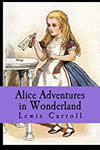 30. Alice's Adventures In Wonderland by Lewis Carroll (August 2010) [Book #94/306]
30. Alice's Adventures In Wonderland by Lewis Carroll (August 2010) [Book #94/306]
Also on the Observer and My Book lists - In one word, this book was "bizarre". This is the first time I have read Alice's Adventures in Wonderland, but I have seen both the Disney and Tim Burton versions, and both of them made more sense than this book. As my friend put it, that must have been some good opium he was on when he wrote this. The story jumps around randomly and it goes from one situation seemingly into an entirely different situation with no rhyme or reason to why. But when you think about it, it makes sense. This is a story about a dream. But it is also a story as described by a child. So you have a dream where things have a habit of just happening in the words of a child who often will jump around and make up things that don't really make any sense, all woven into this magical land where nothing makes sense and things just happen. Although I was greatly dumbstruck at first, the story began to grow on me. Nothing really happened in the story by the end but aren't most dreams like that. At one point, you just wake up. The book is very well written. It just flowed as I read it, with each sentence and each section flowing into the next. Although you knew the situations didn't fit together the narrative was never jarring between different parts. The sentences weren't choppy and it made for a rather enjoyable read to see what would happen next. So I will place this on my to read list, mostly due to the fun that reading the book could instill on a child or an adult who wonders what it is like to think like a child.
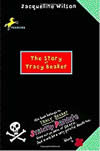 31. The Story Of Tracy Beaker by Jacqueline Wilson (June 2012) [Book #108/306]
31. The Story Of Tracy Beaker by Jacqueline Wilson (June 2012) [Book #108/306]
Also on My Book list - Following the trend of reading the children's books on the list with my daughter we have the first of the Jacqueline Wilson books on the list (of which there are 4). This book is about a girl who lives in an orphanage waiting for a family to foster her. It is told in the first person as a journal that Tracy (the main character) is writing. Actually, I found this book to be very good in the context of a children's book. It shows that children in orphanages are not all broken and that it hardens children to the reality in which they live. They are often rude, aggressive, and troubled, not because they are bad children, but because the situations make them that way and even with those problems they are still good kids. This book is an alternative take on what you would expect from the given situation and not one you would expect. Her mother abandoned her after the mother's boyfriend beat Tracy, hence the reason she is in the orphanage. She was fostered by 2 homes, beaten by one and the other had their own baby, so she had to leave. Based on this premise you would expect something different than what is presented in the story, but you don't. You get a heartfelt story about a girl who misses her mom and understands that sometimes life sucks. But you take what you can out of it. A definite recommend for the children's books.
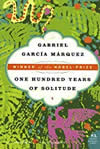 32. One Hundred Years of Solitude by Gabriel Garcia Marquez (June-July 2019) [Book #153/306]
32. One Hundred Years of Solitude by Gabriel Garcia Marquez (June-July 2019) [Book #153/306]
Also on the Observer, Norwegian, and My Book lists - I found myself constantly comparing One Hundred Years of Solitude to Marquez's other work on the list that I read almost 12 years ago, Love in the Time of Cholera. You can definitely get a feeling for Marquez's style between the two books. I have to say though, that between the two, Love in the Time of Cholera was a much easier book to get in to, but One Hundred Years of Solitude was the more impactful. To sum it up One Hundred Years of Solitude was fascinating, horrifying, hilarious, depressing, intriguing, and by the end, I couldn't put it down. The story is about a fictional South American town named Macondo that was founded by the couple José Arcadio Buendía and Úrsula Buendía. Within the story we follow the development of the Buendía family, and despite how large or small the town gets, eventually turning into a thriving metropolis, we never really feel that because of the focus on this family. However, the family mirrors the effects of the town; as the town grows, so does the family, as the town shrinks, so does the family. One of the first things we learn about the family though is that there are issues with the family, specifically incest, which comes up again and again, which is one of those things that is rather horrifying in the story. The story, though, is about cycles, and how everything changes, yet everything stays the same.
One of the hardest parts of the story to get through was the names of the characters. The story was written where time kind of bounced all over. Even the first sentence of the book begins with an illusion to what would happen halfway through the narrative. But the names of the characters were all either identical or very, very similar, making keeping track of who was who extremely difficult at times. By the end I still couldn't remember who was who's daughter/grandmother/aunt. But it works in the context of the story. The Buendía family is constantly making the same mistakes, constantly rehashing the same issues, through several generations, and by renaming their kids after either the patriarch José Arcadio or Aureliano (I believe there was at least 22 Aurelianos mentioned by the end of the story), it got to be rather confusing. This was not an easy book to read because of that. I could only read about 20 pages a night because I kept having to go back and rereading to figure out who was who as time slowly marched on through the story, bouncing back and forth as it went. The chapter breaks generally covered a different person within the generations as they progressed through life as well. So by the time I got to the end of the story, I immediately wanted to jump back to the beginning to see how it all tied together. This is a definite reread story, to catch all the hints about later parts of the story in the earlier sections. It is a story about time, where time doesn't seem to be happening. It is a fascinating tale and a definite one on my must read list, but it is work to get through, if you want to get everything out of it.
33. The Pillars Of The Earth by Ken Follett
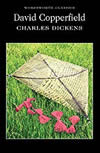 34. David Copperfield by Charles Dickens (January - March 2013) [Book #116/306]
34. David Copperfield by Charles Dickens (January - March 2013) [Book #116/306]
Also on the Observer, Sybervision, and My Book lists - This was one of the longer books I have read in a while and I did greatly enjoy it. I found myself wondering what was coming around every turn of the story. Although, after reading the "review" that was found at the end of my version I did notice some rather odd things about the story. Mainly, the first part of the book felt very, very different from the rest of the book. The first part was rather dark and things kept getting worse and worse for David. Once that portion was past though, the book seemed to level out and although there were some bad times, there was nothing quite like that first part. Another thing that has me confused is on the title itself. The story is named after the primary character, David, who for one doesn't go by "David" for the majority of the story. Also, the story focuses more on the supporting characters than on David himself. I felt I was watching the lives of the secondary characters pass through, rather than seeing the story change by any actions of David himself. The story itself was very well written and I was surprised that characters that seemed to be one-note characters would constantly reappear later in the story. Many of these characters did get tiresome, they eventually did redeem themselves by the end. The story itself is easy to follow and well written and I must say this was the best Dickens' story I have read. By the end of the story, I did feel that some of the character arc conclusions left a little to be desired. But overall, the story was well done and I would have to recommend people pick it up.
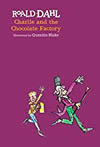 35. Charlie And The Chocolate Factory by Roald Dahl (June 2010) [Book #91/306]
35. Charlie And The Chocolate Factory by Roald Dahl (June 2010) [Book #91/306]
Also on My Book list - Charlie and the Chocolate Factory is so far my favorite of Dahl's works, and likely to remain that way. I had grown up on Charlie, having seen the original movie countless of times and I actually believe I read the book growing up too, although I couldn't remember any of it. Unlike Dahl's other works, which seemed scattered and more like many mini stories with a common theme, Charlie and the Chocolate Factory was a cohesive story with great characterization and a fun read. It was also interesting to compare the two movie versions of the book with the book. Despite my love of the original movie it appears that both of the movies had parts that followed the story very closely and both had parts that diverged from the story a lot, however they were often in different places. Overall, a fun, cohesive story, that is a definite must read on my list.
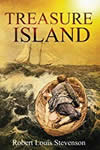 36. Treasure Island by Robert Louis Stevenson (October 2003) [Book #19/306]
36. Treasure Island by Robert Louis Stevenson (October 2003) [Book #19/306]
Also on the Sybervision list -Upon graduating college, I was determined to better myself, and one of the ways I planned on doing that was by reading the 100 Greatest Books of all time. Treasure Island was my first official foray into reading all of those. Most of the book I read first were books that I incidentally had obtained from my grandfathers' collections but eventually I was able to afford some more books on my own. But this was my first real book on the list that didn't have anything to do with a class assignment. The one reason I picked this first was that it was fairly short. I needed to go on a plane flight and picked this book to take with me. The story was a fast paced, "swash-buckling adventure" stories about pirates and the seven seas. It didn't even last the whole round trip to read. I was done with it in a few hours but it was a lot of fun. The book was written as a bedtime story for the authors children. He would write a chapter at a time and read them to the kids. This allowed for the story to grow on its own and maintain a fairly quick pace throughout. The time that I had read the story was around the time I had seen the movie Treasure Planet as well, which followed this story fairly closely (with some obvious changes). Overall, this is a quick, fun read that I definitely recommend.
37. A Town Like Alice by Nevil Shute
 38. Persuasion by Jane Austen (August 2004) [Book #32/306]
38. Persuasion by Jane Austen (August 2004) [Book #32/306]
Many of the books on my list remain with me long after I have read them and some are forgotten completely. This is one of those forgotten completely books. This is easily not the best of Austen's work, which is probably the reason why it is not mentioned alongside Pride and Prejudice, and it is also not even close to my favorite. The plot-line was a little hard to follow and the book was slow to start off at first, however about halfway through I had no troubles at all. The book is a love story, like many of Austen's works. It follows a young girl who was persuaded to let her one true love get away (hence the title). The book then picks up seven years later while she is still alone, when her true love suddenly returns. Persuasion does stand out from Austen's other works, primarily Pride and Prejudice, because the main character is not looking for marriage, but is actually trying to avoid it. She does this mainly because she feels she is too old for marriage. If you are an Austen fan then you should read it because it is not all that bad, however it was just not for me.
 39. Dune by Frank Herbert (December 2006) [Book #55/306]
39. Dune by Frank Herbert (December 2006) [Book #55/306]
Also on My Book list - Dune is often cataloged as one of the greatest science fiction stories ever told and the precursor to all science fiction that has come since. It is also frequently listed as the first book within the bestselling science fiction series of all time. These are all titles that the book has rightfully earned. Dune contains parallels in religion, politics, and environmental changes to modern day society, even when it was written back in the 1960's. The story takes place in our the distant future (at least 20,000 years) and the only concrete evidence that it even takes place in our universe is a quick mention of Earth in the appendix. We follow a 15 year old boy who turns out to be the prophet that a culture of desert dwellers has been anticipating. He then must not only learn to live in the harsh environment but to use his "magical" gifts properly. I recommend this book because not only is it the precursor to all modern day science fiction stories but because it is riveting and extremely well written. It is a bit of what is classified as "hard science fiction", meaning that there is a lot of science and not much of the more fantastical elements, but it is still a riveting story none-the-less. My only problem is now I have this urge to read the rest of the series.
 40. Emma by Jane Austen (October - November 2006) [Book #53/306]
40. Emma by Jane Austen (October - November 2006) [Book #53/306]
Also on the Observer list - Coming into Emma with a fairly large preconceived notion about the Austen/Bronte books of the time, I was pleasantly surprised and this book was actually better than I was expecting. Once I got passed Austen's round-about way of speaking the book rather intrigued me. The story is about a female in her early twenties among the upper class social scene of rural England. She had vowed to never marry in order to not stress her father. Instead of indulging in her own love-life, she then tries to hook up her friend Harriet. The problem comes when Emma realizes that she is really bad at playing match-maker and eventually causes more problems than if she had just left everything alone. The story wraps up very nicely in a happily-ever-after ending. My biggest complaint of the story is that the language used made the book very difficult to follow at times and Austen could have definitely used "by the bye" far less. Although I enjoyed it, I do not recommend it, especially compared to Austen's much better and more famous Pride and Prejudice.
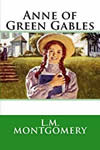 41. Anne Of Green Gables by L. M. Montgomery (December 2011 - March 2012) [Book #103/306]
41. Anne Of Green Gables by L. M. Montgomery (December 2011 - March 2012) [Book #103/306]
This was one of the books that my daughter and I have been reading together. I have had this book for a little while and have been hesitant to read it because of it's length but we had just finished Little Women, so I figured this wouldn't be so bad. Well, I didn't really like this book. I hated the main character, Anne, for most of the book, and the secondary characters didn't really do it for me either. I felt that even when one of them died, I didn't feel too much for them. The problems were in the way this book was written. It was written about a little red-headed girl who couldn't shut up. And that is how it felt, you just wanted her to shut up for most of the book. As she progressed and got older through the book it got a bit better but I feel that the morals of the story were wrong in many instances (you shouldn't cry for people that go away or die because that is against your religion and other similar morals). It was an OK book in my opinion but nowhere near any of the greats that I have read on this list.
 42. Watership Down by Richard Adams (April - September, 2014) [Book #124/306]
42. Watership Down by Richard Adams (April - September, 2014) [Book #124/306]
Also on My Book list - I had read Watership Down over a six month period to my daughter, reading about 4-8 pages a few nights a week. It is a long book to read like that but overall the story was straightforward enough that I was able to do this. There were not a lot of twists and turns that would require extensive knowledge of previous parts of the book to make sense of the ending. In general, the story follows a group of rabbits that leave their home due to the psychic feelings of one of the rabbits. They eventually make their way to a new home but realize that they don't have any female rabbits and need to recruit some of them as well. Although, this is a simple story it is by no means bad. I really loved the way it is written. The descriptions given throughout the story are fantastic and you really get to feel for these rabbits with their struggles. The story is gripping and you really do not know who is going to live and who is going to die. How might they get out of a certain situation? And even though many things that happened would be out of the ordinary in a rabbit's world, the author set it up so well that it made sense in the story. I enjoyed how the author treated the different species as well. Mostly, if an animal was a different species the language would appear broken to the rabbits since that was not their native tongue. It really isolated them from the rest of the animal kingdom but also set up some opportunities for these rabbits that other rabbit groups would not have thought of. Overall, this story is often referred to as a children's book, probably because it is written at a junior high level and also, it is about rabbits. I would not pigeon hole it, though. This is probably one of the best books I have read in the last few years, and if I was not reading it with my daughter, I probably would have finished it within a few days. A definite recommend.
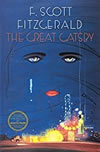 43. The Great Gatsby by F. Scott Fitzgerald (1996?) [Book #4/306]
43. The Great Gatsby by F. Scott Fitzgerald (1996?) [Book #4/306]
Also on the Observer, Zane, and Sybervision lists - Along with a host of other significant stories of the early 1900's, The Great Gatsby finds itself as another mandatory school read. And like many of those books, this is one I need to go back to some day to truly understand the details that I likely missed as a high school student. The book follows the life of a man in the 1920's, who created his fortune (a member of the nouveau riche) while living around people who inherited theirs. These separate worlds clash during the Roaring 20's when people accustomed to "the old ways" must learn to adapt to the new ways that are up and coming. However, Gatsby's excesses may be a bit more than even the most liberal of people could withstand (at the time). A novel about religion, poverty to wealthy, love, and a whole host of other themes interwoven into the fabric of the quintessential 1920's American story.
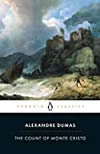 44. The Count of Monte Cristo by Alexandre Dumas (Januray - March 2023) [Book #175/306]
44. The Count of Monte Cristo by Alexandre Dumas (Januray - March 2023) [Book #175/306]
Also on the Observer and My Book lists - The Count of Monte Cristo actually ended up being one of the longer books that I have read at 1,200 pages, which doesn't seem that long compared to some books, but this was a densely typed up book for those 1,200 pages. And although it was very long, and took me three continuous months to read, I actually greatly enjoyed it. The story follows Edward Dantès, who gets accused of a crime and locked away for many years. While in solitary confinement he befriends an abbe who is also locked up and helps him to not only escape but how to unearth a vast treasure. Upon his escape he plans meticulously at retribution against those that have wronged him. And while the story could potentially get tedious, it never actually does. It remains fresh and enjoyable throughout. The beginning part of the story takes place during the exile and eventual return of Napoleon, a period of time in French history that I am not as well acquainted with, and I found this little insight from the French point of view fascinating and how these events helped shape what the story became. My favorite parts were towards the beginning, while he is in prison, but even the latter half that turns into a Jane Austin novel, are also remarkably fun and enjoyable. My biggest problem was just keeping everyone straight and who did what to who and how they all are related to Edward, or the Count of Monte Cristo, as he eventually became known. Overall, this was an excellently paced novel and very well written, and I am putting it on my personal greatest books list as a recommend.
45. Brideshead Revisited by Evelyn Waugh
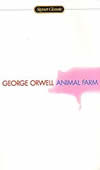 46. Animal Farm by George Orwell (1996ish and February 2007) [Book #5/306]
46. Animal Farm by George Orwell (1996ish and February 2007) [Book #5/306]
Also on My Book list - I had read Animal Farm in high school, like so many other great books, but I was able to go back and reread it as part of my official 100 Greatest Books read through. I find this novel fantastic and insightful, especially knowing what I know now about communist Russia and society as a whole. The book is very fast paced (I read it in about 2 hours) and it's a fun read. The story is like a children's book, which had been forced through a harsh realism filter. In essence, the story is about a group of farm animals who find that their Master has gone over the line one too many times and they take over the farm. They run the farm well as equals (at first), but then dissension starts to appear when the two "leaders" start to fight and one ousts the other from the farm. Orwell's portrayal of communistic society is chilling and he makes it understandable both to the point of how this can happen and why people let it happen. The concept of the book can be generalized in these famous lines near the end: "All animals are equal. But some animals are more equal than others." Definitely on my must read list.
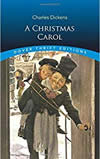 47. A Christmas Carol by Charles Dickens (December 2004) [Book #33/306]
47. A Christmas Carol by Charles Dickens (December 2004) [Book #33/306]
A Christmas Carol tells the story of a miserly scrooge who eventually learns to feel the Christmas spirit after being threatened by three Christmas spirits. The story in the book is just like the story many people already know through its countless adaptations. However, anyone who is familiar with adaptations knows that the books can be very different from their adapted counterparts. After reading the story I discovered that, for one, this story is rather short and therefore many of the adapted versions actually follow the story fairly well, with each one leaving out one thing or another for the sake of flow and brevity. Overall, this is an enjoyable story which is a quick and easy read. A perfect read for the holiday season.
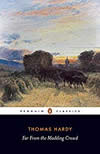 48. Far From the Madding Crowd by Thomas Hardy (September-November 2012) [Book #113/306]
48. Far From the Madding Crowd by Thomas Hardy (September-November 2012) [Book #113/306]
Also on the Sybervision list - I have mixed feelings about this book. On the one hand the ending was exactly as I had hoped for during the duration of the book and I felt excited that it was actually happening. I was also pleased that I wasn't sure exactly what direction the book was going for the majority of it. It kept me guessing. On the other hand I kind of get tired with books that take a strong female lead and beat her into submission for the majority of the book. The main female character, Bathsheba, was this strong, independent woman who could not stand to think of a relationship for the first half of the book. But then that one man comes into her life that spells trouble. The story revolves around the mistakes she has made in her 'love' life and how she must own up to them. The book is well written and easy to follow, so there were no problems there. At the end of the book I felt that it was a must recommend (based on that satisfactory conclusion) but for the majority of it I couldn't see this as being a good book in the modern context (I don't typically appreciate the degradation of a strong female character). So I will say that you should read it if you are aware of what you are in for and can accept that.
49. Goodnight Mister Tom by Michelle Magorian
50. The Shell Seekers by Rosamunde Pilcher
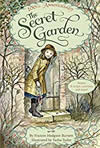 51. The Secret Garden by Frances Hodgson Burnett (September - October 2010) [Book #95/306]
51. The Secret Garden by Frances Hodgson Burnett (September - October 2010) [Book #95/306]
Also on My Book list - For a children's book, this was not what I was expecting. I was expecting more of the same from what I have read in my daughter's other books including some of the ones on this list. However, The Secret Garden was actually very good. The lessons that the story espouses we remarkably poignant, demonstrating that children are not a product of their birth, but more a product of their upbringing. And that children who seem completely lost to the point that nobody could care for them, somebody still might and bring that child back from the brink, resulting in a normal, happy, and fulfilling childhood. I would have to recommend this to any parent and child as a lesson in how to view life. Although the parts about the "magic" did seem a bit too preachy for my taste, it was not over-the-top.
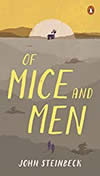 52. Of Mice and Men by John Steinbeck (1994?) [Book #1/306]
52. Of Mice and Men by John Steinbeck (1994?) [Book #1/306]
Also on the Sybervision list - Of Mice and Men is often listed as a book everyone is "forced" to read in high school, however this book turned out to actually be one of my favorites. I enjoyed it when I had read it back in the day, but I must try and reread it with a more mature mind. The story is about two companions. One of which would be considered to have a learning disability, Lennie, while the other individual, George, is the man that takes care of him and tries to make sure he doesn't get into trouble. Which doesn't always work out the way that he hopes. The plot follows the hard times of the great depression with these men as farmhands and how their relationship is a rare thing. Definitely an emotional read and one I hope to get back to someday.
53. The Stand by Stephen King
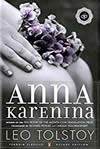 54. Anna Karenina by Leo Tolstoy (December 2008 - January 2009) [Book #80/306]
54. Anna Karenina by Leo Tolstoy (December 2008 - January 2009) [Book #80/306]
The only one on all 5 lists (Norwegian, Observer, Sybervision, and Zane) - Being the only book on all 5 of my Greatest Books lists, I had high hopes for it. And to start off, I thought this was one of the most well written stories I have ever read. Tolstoy just flows with descriptions that make you feel you understand everything that is going on. The characters are extremely well developed and even though they are Russian (which has a tendency to jump around with names a bit) it is still easy to follow who is who. I enjoyed several of the references to early communist culture (the book takes place about 30 years before the communist revolution) and several of the characters' personality polarities and themes that are emphasized in the book (religious vs non-religious, upper vs lower class, etc.). However, I did have some problems with the book. The story felt like two separate stories going on at the same time. The "main" one should be the one with Anna but I got the feeling that for the most part the main story was the one that centered around Levin, who supposedly represented Tolstoy himself. The Anna story itself felt enjoyable and well written, focusing around her leaving her husband for another man, of which that relationship slowly dissolves over the length of the book as well. While the story with Levin, although in parts were very good, I felt was very political and sometimes unimportant to anything. The whole last section (after the Anna story line was wrapped up) felt forced and out of place, leaving me wishing that the book would just end. All in all, I very much enjoyed the first half of the novel but the second half seemed to drag on a bit. I am not going to recommend this on my list and personally would not consider this the greatest book ever. But being that it is on so many book lists it probably should be one that you read.
55. A Suitable Boy by Vikram Seth
 56. The BFG by Roald Dahl (November 2008) [Book #79/306]
56. The BFG by Roald Dahl (November 2008) [Book #79/306]
Also on the Observer list - The BFG is a children's book about a little girl who discovers a Big Friendly Giant (AKA the BFG). Along with the BFG, there are other giants who are not so friendly, well, because they eat people. The plot of the story is that the little girl convinces the BFG to take the bad giants down. I found this to be a rather gruesome story for a child but ended up being a perfect children's book. My main gripe, and this is a general gripe with Dahl, was that the made-up words got to be a bit tiresome after a while. The story has clear cut morality issues and includes a heroine who is just your everyday kid. It is a good story for kids that parents do not need to be too worried about, despite the gruesomeness. Overall, the book was enjoyable, but it was just not my cup of tea.
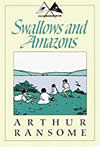 57. Swallows And Amazons by Arthur Ransome (March-May 2013) [Book #117/306]
57. Swallows And Amazons by Arthur Ransome (March-May 2013) [Book #117/306]
Swallows and Amazons was the next book I chose to read with my daughter and I found it quite interesting. The book follows a family of four children who are staying on a lake during the summer. There is an island in the lake, which they go to camp on for several days (weeks?) and they meet up with some other children who do the same thing. The interesting thing about the book is that it introduces a lot of nautical terminology. I am not a big boat person so several of the phrases confused me but overall the author did a good job introducing them in such a manner so they were self explanatory. The author also took the time to explain very intricate details of living on this island, perhaps going into tedium. He would explain what the boats looked like and how the food was prepared. Even though the book was well written and rather interesting at times, I wouldn't rate this as one of the Greatest Books. Enjoyable for a child, but I have no desire to continue reading the stories that follow this one.
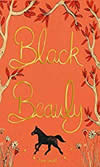 58. Black Beauty by Anna Sewell (March 2011) [Book #100/306]
58. Black Beauty by Anna Sewell (March 2011) [Book #100/306]
I rather enjoyed Black Beauty. I thought it had an interesting perspective, which was looking at a horse's life through the eyes of the horse. It didn't have the ridiculous "animals talking" thing that a lot of books have, but I felt it was rather natural. The way a horse would act if you could get inside it's head. You saw his (Black Beauty's) life from the time of being a young colt through to his "retirement home" and all the things that went right and went wrong along the way. The author also showed other horses, and people, and how their lives changed, and how that impacted Black Beauty's life. I also really liked how information was only gained by the reader through the horse, so the only way you knew how a conversation or event went was when they were in proximity of the horse so he could relay it to the reader. Very well done, but I feel it is a bit simplistic and better off as a children's book. Not really belonging on the 100 Greatest Books list, so I will leave it off of my Must Read List.
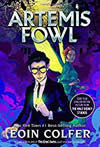 59. Artemis Fowl by Eoin Colfer (November 2015-January 2016) [Book #133/306]
59. Artemis Fowl by Eoin Colfer (November 2015-January 2016) [Book #133/306]
Artemis Fowl is another book that falls into the "Young Reader" or even perhaps the "Teen Lit" category. You can tell because it is only ~250 pages long and is in the typical larger paperback format associated with "kid books". The story is about a highly intelligent 12 year old, who sets out to rebuild his family's fortune which was lost by his father. Even though he is highly intelligent, he does have problems like the fact that his father went missing (likely covered in a future book) followed by his mother having a breakdown and becoming mentally ill and bedridden. In order for Artemis to regain his family fortune (mostly gained through illegal means in the first place), he hatches a scheme to obtain gold as ransom for a kidnapped fairy; a creature who is generally thought of to be a fairy tale in this world. In general, I thought the story was actually rather good. I enjoyed reading it and I could not for the life of me figure out the ending. When it came, it was rather anti-climactic, but it worked for the story. What really surprised me about the story though was that even though the title is Artemis Fowl and the first few chapters focus around Artemis, the bulk of the story centers around "The People" as the fairies, goblins, trolls, and other magical creatures are referred to. You see the world of the humans, and how this kidnapping and rescue proceeds, mostly from their perspective. This was something I wasn't expecting going into the book. The book is written as a world building story, with obvious plans (that since have been written) to expand upon the characters and story lines. Overall, I would say that the story was fun to read with a surprising twist at the end that definitely made it a feel good story. I'm not surprised of the success of the book, as I thought it was pretty good, but I would hardly rate it as one of the best books of all time.
 60. Crime and Punishment by Fyodor M Dostoyevsky (1999) [Book #12/306]
60. Crime and Punishment by Fyodor M Dostoyevsky (1999) [Book #12/306]
Also on the Norwegian, Sybervision, and My Book lists - After reading Crime and Punishment, Dostoyevsky went straight to one of my favorite authors. The book follows a man who feels he can commit the "perfect murder". Unfortunately, his guilty conscious gets the better of him and after a long, agonizing reflection period he is eventually caught and punished for his crimes. The writing was excellent, and the story gave us every little nuance in the character's subconscious during the whole ordeal, from planning to regret. This book also illustrated to me that Russian actually translates very well to English, where I have rarely had difficulty in understanding a Russian-to-English translated work, and it has made Russian writers usually some of my favorites. In actuality, my only problem with the book is the epilogue, which is so out of place in the story that it is obvious it was added afterwards because the publishers were unhappy with how the original story concluded. To get the full impact of the story a reader may just want to not read that section, in my opinion. This is a definite recommend in my opinion.
61. Noughts And Crosses by Malorie Blackman
62. Memoirs Of A Geisha by Arthur Golden
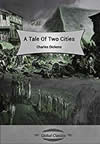 63.A Tale of Two Cities by Charles Dickens (2004) [Book #29/306]
63.A Tale of Two Cities by Charles Dickens (2004) [Book #29/306]
Also on the Sybervision list - "It was the best of times, it was the worst of times." This is perhaps the most memorable opening to a novel in the history of literature (except perhaps Moby Dick), but it is also a novel that seems to have faded from my memory over time. I have found Dickens himself becomes a bit drab to read. He likes to pull his punches in his stories, so in the end they don't have as much of an impact as they could otherwise have. The book itself was a rather enjoyable book though about London and Paris (the aforementioned two cities) during the time of the French and American Revolutions. It is a romance showing how far people are willing to go for the ones they love during times of crisis. The story ended up being rather confusing at times and it is definitely not Dickens' best work, but an enjoyable story nonetheless.
64. The Thorn Birds by Colleen McCollough
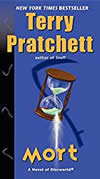 65. Mort by Terry Pratchett (March 2016) [Book #135/306]
65. Mort by Terry Pratchett (March 2016) [Book #135/306]
The second of Terry Pratchett's Discworld books that I read on the list is Mort. This is actually book 4 in the Discworld series and although you don't HAVE to read the books in order, I do. Book 1, The Colour of Magic, which I read and reviewed in 2011, is on the list. The following two books were not on the list and I listened to them via audiobook (I have to physically read the book if it's on the list, otherwise I can do audiobook), and then I read this book. The basic premise is that Death, a character that has shown up off and on in the previous three books, is tired of his job and looking to take on an apprentice. The apprentice he has chosen is Mort. Hilarity ensues as Mort ends up screwing things up and tries to figure out how to fix things. In general this book, like the other Discworld books, is very short, just over 200 pages in paperback, so it is a quick read. But it is an enjoyable read. After the first two Discworld books, Pratchett seemed to reign in his snarky humor, allowing for the storytelling to take center stage. Whereas I felt the first two books were more a direct commentary on society, Mort was more of a story set in the Discworld universe with commentary sprinkled here and there. While reading Mort, I at first wasn't all that enamored with it. I couldn't see where it was going and it was starting to be a little bit of a slog. That changed however when Mort screws up big time (I won't spoil it) and has to figure out how to fix it, which he does for the rest of the novel. In general I rather enjoyed this book, not as much as The Colour of Magic which I still think was one of the best satirical novels I have ever read, but I still thought it was an enjoyable, worthwhile read.
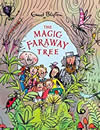 66. The Magic Faraway Tree by Enid Blyton (March-May 2012) [Book #107/306]
66. The Magic Faraway Tree by Enid Blyton (March-May 2012) [Book #107/306]
The first thing that comes to mind after read this book is "what the hell?". I have read some really good books on the list, and some not so good ones, but this comes close to one of the worst books I have yet read. I didn't even know it was the second book in a series until I looked it up afterwards, which explains some of the initial confusion. The story is about a bunch of children who go into the woods and visit magical lands on top of a magical tree. This is also not in the imaginations of the kids but is really happening, since the mother meets many of the creatures that come from the tree. Really? That is how you want to do this? I would have thought it was all in their minds and the mother doesn't see it. That would have been the way to do it. But no. That is not the story. Also, the lands in general suck. There is the Land of Do-As-You-Please and other such nonsense. The book itself reads as several short mini-stories wrapped into one book, with them going on a mini adventure that is summed up in a couple of chapters. The good thing is that the stories are not drug out, and they get resolved fairly quickly. This book is such trite garbage that I don't recommend it to anyone.
67. The Magus by John Fowles
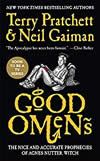 68. Good Omens by Terry Pratchett and Neil Gaiman (June 2019) [Book #151/306]
68. Good Omens by Terry Pratchett and Neil Gaiman (June 2019) [Book #151/306]
Also on My Book list - Good Omens has been on my radar for a while now, having been a fan of Terry Pratchett ever since first starting his Discworld series. And with the beginning of the Good Omens TV show, I was prompted to pick up the book earlier than I otherwise would have done. Pratchett is a very smart and funny writer. He is able to weave political and social commentary throughout his books in a very humorous and sometimes even subtle way and I love him for it. Gaiman, I had never read before, but I am well acquainted with his work. I know he is very knowledgeable about mythology and religion, so I figured this was going to a very good book, both from hearsay and from the authors' reputations. And I was right. The story is about the birth of the Antichrist and the coming Armageddon that shortly follows. The story follows along with an angel and a demon as they try and figure out what is going on. These are not your stereotypical angel and demon. They are flawed and they are fantastic for it. Not only is the story well written but it is as hilarious as I expected. There wasn't a space of five minutes when I wouldn't laugh out loud. Within the plot we follow around several different groups of people as they all come together eventually in the end, for one reason or another. I would say that my only problem with the story was the ending. The story ended too easily. Many of these groups of people didn't really have anything to do with how the story played out. Like, why were they in the story in the first place if they weren't going to have an impact on the story in the end? They felt wasted and it annoyed me a bit to see them tossed aside like they didn't really matter to the story as a whole. Overall, the story is a definite must read. I can see why it has become a cult classic and I can't wait to see the show because I can picture some of these scenes perfectly laid out for television. Even with the ending being a bit 'meh' for me I can still give it my full recommend.
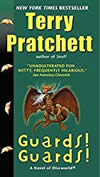 69. Guards! Guards! by Terry Pratchett (May 2016) [Book #136/306]
69. Guards! Guards! by Terry Pratchett (May 2016) [Book #136/306]
Guards! Guards! is the 8th book in Terry Pratchett's Discworld series and the third to be featured on the BBC's 100 Greatest Books list. That should tell you something about the quality of writing that appears in the Discworld series. However, since the BBC 100 Greatest Book list is a reader chosen list, this could just mean that he is popular in England, but not really worthy of being placed on the list (I'm looking at you Wilson), however that is not the case. Each of Pratchett's entries into the Discworld series (as of the first eight entries that I have read) have been works of literary art. He crafts language in such a way that many authors try to imitate but never get the full gist of. Of the first eight novels, six have been a standalone stories (Books 1 and 2 form one continuous story-line). However, the way that Pratchett crafts his novels, produces a reading experience that does not force you to read the stories in order. This is also a draw back for the series as well though, where one story does not have many (if any) impact on future stories. Even world altering events, which can occur in one book, are barely referenced, if at all, in future novels. For this reason, the timeline is also very difficult to pin down, even though several characters appear throughout different story-lines within the overall series. The Discworld series is broken up into character subsets, where every few books he returns to a character or group of characters (i.e. Rincewind, or the Witches) and focuses on them. And it seems that for the first few books, the kickoff stories seem to be his most popular, with all three out of the four Discworld books on the 100 Greatest Books listed being a kickoff story.
Guards! Guards! takes place following the Night Watch of Ankh-Morpork, a group that basically has gone defunct since the Patrician came into power some couple hundred years ago, but the group still persists. The story begins as a sect of people are trying to take over the government by calling a dragon from who-knows-where, to scare the city. This will allow a long lost heir to the throne to come, save the city, and be crowned king, therefore kicking the Patrician out of power. Things obviously don't go as planned and the Night Watch is left to save the day. Out of the three current Discworld stories on the list (that I have read), I would say this one has the most plot, which is definitely a great thing in a book to have. I felt in Pratchett's other books, the story-line could be summed up in just a couple of pages. It was the satire and the way Pratchett describes things though that really made those books worth reading. But with the addition of a worthwhile plot, it elevates this story to one of his better among great stories. His humor, as always, is spot on in this story, with nothing lost through his continuing to write in this series. If anything, his books have become better and better. I would have to say, out of the three books, this book is my second favorite after the first in the series, The Colour of Magic. And that's only because nothing has come close to the humor in that book, of which I don't think he has even tried since. With Pratchett's approach of changing his writing style and character focus through the Discworld series, he has continually made the series feel fresh with each entry. So far, I would say that if for some reason you don't like one book in the Discworld series, try a different book, it is likely going to feel completely different.
70. Lord of the Flies by William Golding
Also on the Observer list -
71. Perfume by Patrick Süskind
72. The Ragged Trousered Philanthropists by Robert Tressell
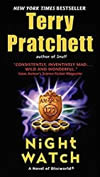 73. Night Watch by Terry Pratchett (June-July 2022) [Book #172/306]
73. Night Watch by Terry Pratchett (June-July 2022) [Book #172/306]
Also on My Book list - Night Watch is the 29th book in Terry Pratchett's Discworld series, with several other books having also made it onto the BBC 100 Greatest Books list including The Colour Magic, Mort, and Guards! Guards! Having started the first book of the series (The Colour Magic) I have slowly been working my way through all of them so that I could read them in release order, having finally gotten to Night Watch. Throughout the first 29 books (totaling more than 40 in the series), there have been multiple story lines that have appeared with many of the books having absolutely nothing to do with any of the other books except that the location was on the Discworld. Of these varying storylines, Night Watch is the 6th book focusing on the Night Watch, a series of books that began with Guards! Guards!. Having read them all (up until this point) I can say that the Night Watch novels have not been my favorite of the bunch, but they have generally been enjoyable. This book, however, was quite different from all of the preceding stories. Generally the books are about the Watch as a whole, led by Commander Vimes, with many other Watchmen included in the mix. The number of different Watchmen slowly increasing over the course of the series. And while you don't need to read the entire series to understand and enjoy the books, it definitely does help when character names are mentioned and previous plot points pop up here or there. In fact this entire story starts with the murder of a Watchman (off screen), which we had known from quite a few of the previous stories. We are quickly time traveling with Vimes (through the use of magic) to back when he was a young recruit in the Watch and his history takes an interesting turn. Although my feelings on the Watch novels are generally so-so, this one felt so different from the others that I did greatly enjoy it. It was new and fresh but with many of the same characters we had seen introduced in a wide array of the previous books. And although the Discworld books are generally satirical, I felt that this one was more serious in nature. Pratchett's writing is still spot on and hilarious at times but I felt he was more going for a serious narrative and one that he hit amazingly well. This is likely one of the best of the Discworld books and one I would definitely recommend. I feel that even if you were to read this book without all the backstory from the other books there isn't much you would be missing. Highly recommend.
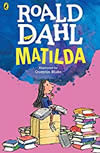 74. Matilda by Roald Dahl (July 2010) [Book #92/306]
74. Matilda by Roald Dahl (July 2010) [Book #92/306]
Also on My Book list - I rather enjoyed Matilda a lot (my daughter and and I both did). I found this to the best of the Dahl books that were on my list. The story was nice and linear, as opposed to several of his other books which seemed to be more disjointed. The characters were also some of his best and actually made you care about what happened to some of them, which is one sign of a good book. I loved how the story tied up very neatly at the end and how aspects of people's personalities came back in a rather surprising (at least to me) way. The story is about an extremely intelligent 4-5 year-old girl named Matilda. However, she happens to live in a house where her parents don't think anything is possible out of the girl and her school's headmistress hates children. So life kind of sucks for her. But she does have a teacher who goes to bat for her and in return Matilda not only helps the teacher out of a bad situation but helps herself as well. The morals of the story are great and at many points in the book I actually got rather upset at several of the characters. Another great thing about this book, and most of Dahl's works, are the use of larger words. Words you wouldn't typically find in children's books. He uses them in such a way that they fit into the context of the story and the person is able to understand the meaning of the words, just by the context. Matilda is another Dahl book I will add onto my personal Greatest Books list, and actually I think it should be ranked higher than Charlie and the Chocolate Factory.
75. Bridget Jones's Diary by Helen Fielding
76. The Secret History by Donna Tartt
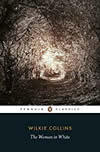 77. The Woman in White by Wilkie Collins (July-August 2007) [Book #62/306]
77. The Woman in White by Wilkie Collins (July-August 2007) [Book #62/306]
Also on the Observer and My Book lists - Of all of the books that I have read across these 100 greatest books lists, the genera that is by far one of the least represented is the mystery. Luckily we get an excellent taste of mystery in The Woman in White. The story focuses on a mysterious woman who recently escaped from an asylum. Through the story she crosses paths with the main character, Walter Hartright, and she ends up being intertwined with the plot of several different characters throughout the story despite not always being present in the story. Since this is a mystery I will not give away any of the more interesting plot points (potentially ruining it for people) but I will say that it is a love story and it all turns out well in the end. I recommended this book to anyone who wants to have a fun sit-down with a book, since it is very easy to read, flows naturally, and is enthralling from the get go. The climax seems to come a bit early, but even though the narrative slows down afterwards, it never stops. Overall it is very entertaining and a must read in my opinion.
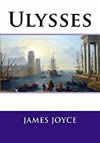 78. Ulysses by James Joyce (March-April 2007) [Book #58/306]
78. Ulysses by James Joyce (March-April 2007) [Book #58/306]
Also on the Observer and Norwegian lists - Although Ulysses is often listed as one of the best books of the 20th Century, I have some definite problems with it. My primary problem with Ulysses is it is written in an odd style, where no two chapters are similar in vocabulary, style, or even concept. Some examples include one chapter written like a play, one with newspaper type headlines, and one that illustrates the evolution of the English language over time. The story itself is based off of the Odyssey set in modern day (early 19th century) Ireland, where the author uses various quirks of language and format style to illustrate several different portions of the story. Had I read this book in a class where they could explain the information to me, I feel like this would have been a much better book, but I didn't. I did have to look up several descriptions of the book chapters online to figure out what was going on and after that the book became much better, but it is still a very difficult book to read. When reading it by yourself some of the sections are completely unintelligible, although the parts I did get I could tell where this book was groundbreaking for its time. After all is said and done though, I'm just not able to recommend this book to anyone anytime soon.
79. Bleak House by Charles Dickens
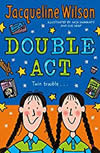 80. Double Act by Jacqueline Wilson (July 2012) [Book #110/306]
80. Double Act by Jacqueline Wilson (July 2012) [Book #110/306]
This is another book by the person who brought us The Story of Tracy Beaker, which I recommended. I thought that story was different enough to be considered by people to read. This book has a similar vein in that it is a story told in the first person, but this time by a set of twins. They go back and forth as to who is writing the story talking about their day to day lives during some major changes as their father quits his job and moves to the country with a girlfriend, bringing them along. I enjoyed reading the story but I felt that nothing really changed by the end of the book. I felt the same at the beginning as I felt at the end. Kind of blah. Sure things happened and the book was different at the end, but not a really satisfying finish. It felt like an episode of a sitcom. An OK read but not a "great" story as some on the list, so I can't recommend anyone pick this up.
 81. The Twits by Roald Dahl (May 2010) [Book #90/306]
81. The Twits by Roald Dahl (May 2010) [Book #90/306]
The Twits was a rather interesting book, as I've come expect from Dahl. The story follows a married couple who are the most despicable, ugly people you could ever imagine. The things that they do eventually get them into trouble, where they eventually get their just desserts in the end from the trouble they cause. Although Dahl can be a bit gruesome at times, he does go out of his way to never fully describe the gruesome act, just imply it. So, I think this could be a nice book for children to read since it starts off with a very good lesson; that if you continually have ugly thoughts you turn into an ugly person but if you continually have good thoughts you turn into a good looking person, no matter what your outward appearance may be. Overall, not a fantastic book, but it is fun and short, and it is the first book on the list that I read to my daughter.
82. I Capture The Castle by Dodie Smith
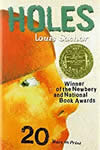 83. Holes by Louis Sachar (December 2010) [Book #97/306]
83. Holes by Louis Sachar (December 2010) [Book #97/306]
Also on My Book list - I had a preconceived notion about this book because I saw the movie a few years ago and rather enjoyed it, making me feel like I would enjoy the book as well, and I was right. The movie followed the book rather closely, but it still had been long enough since I saw the movie that not everything was as obvious to me while I was reading through the book. The story is well paced, often bouncing back and forth between the past and the "current time", always making it clear what time you were in. My favorite thing about the book is that there wasn't one wasted part of the story. Anything mentioned in the historical context actually came back up in the present context, even when you wouldn't have thought of it. Overall, I would list this as one of my must reads because not only is it a fun story, I feel it was very well written and actually displays a very good moral lesson.
84. Gormenghast by Mervyn Peake
85. The God Of Small Things by Arundhati Roy
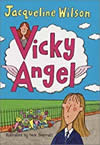 86. Vicky Angel by Jacqueline Wilson (January - February 2014) [Book #121/306]
86. Vicky Angel by Jacqueline Wilson (January - February 2014) [Book #121/306]
This was the final of the Wilson books that are on the list (including The Story of Tracy Beaker, Double Act, and Girls in Love) and I must say this one was the worst one to read. The story focuses on a young teenage girl, Jade, who's best friend, Vicky, dies by being hit by a car during the first part of the book. She is then visited by her friend throughout the book as a "ghost" (however it may just be in her mind). The Vicky ghost gets progressively meaner throughout the story not allowing Jade to make any friends and causing her to be increasingly mean to everyone. On top of that Jade's mother is having an affair, which she discusses with Jade, and her father is perhaps a pedophile, obsessing over pictures of Vicky after she had died. It was like the author thought, how could I make things even more uncomfortable throughout the story. It is not like this is supposed to be higher literature either, this is a children's book. The writing itself is OK, fairly easy to read, but nothing exceptional. Perhaps the purpose of this book was to help children/teenagers come to grips with loosing a friend, however the way the story is written I think it would just end up making things worse. The story works out in the end but it is a very long, tortuous road to get there and there isn't much of an explanation as to why Vicky was being so mean by the end of the book. It blows my mind why any of these Wilson books made it onto this 100 Greatest Books list. They are just a transitory thing and I'm sure that if the list was redone today, they more than likely, would not make it on there. Thankfully I am done with them.
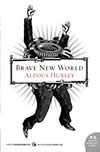 87. Brave New World by Aldous Huxley (August 2019) [Book #157/306]
87. Brave New World by Aldous Huxley (August 2019) [Book #157/306]
Also on the Observer and My Book lists - Brave New World can be pictured as the original dystopian-future novel. Written in 1931, Brave New World envisions a world 600 years in the future where the principles of Henry Ford, of the Model T fame, have been taken to the extreme with human beings being produced on assembly lines and natural birth almost all but eliminated. It is definitely a unique view on the future I had not anticipated. Having seen many dystopian movies and read other dystopian novels this was interesting to go back and look at what the future looked like from a 1930's perspective. The "advanced" technology is exactly as you would envision 1930's "advanced" technology to be, kind of steam-punkish, not the technology of today. And it is less technologically advanced as more biologically advanced. In this future they have perfected making a society were nobody wants more in their station of life, by making sure people manufactured for their particular station. This means that many people are dumbed-down to feel better in more menial tasks and some are allowed to excel beyond these menial tasks. The story shows us how a kid who grew up in the "savage lands", a reservation exempt from this "utopia", would feel in such a land and how this utopia. Although referred to by the derogatory term of "Savage", I believe Huxley's point was to portray him as one of us thrust into this "utopia" of sorts and how we would feel in such a world. I would say my only major gripes with the novel was his depiction of women, who were essentially relegated to being sex-hungry, mindless, pieces of meat added as something for the main character to "deal" with, not as characters in their own right. But other than that the story was intriguing, wholly engrossing, and flowed nicely. I breezed through the novel much quicker than I was ever anticipating. I would definitely place this on my recommend list.
88. Cold Comfort Farm by Stella Gibbons
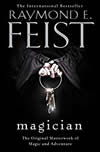 89. Magician by Raymond E Feist (September-October 2019) [Book #159/306]
89. Magician by Raymond E Feist (September-October 2019) [Book #159/306]
After having read a few of the more historical fiction novels, I was in the mood for a fantasy novel. Looking through my list I found Magician, which even though it was a rather long book (at over 800 pages), it seemed like it would be a fun read. The book itself is set on the world of Midkemia in an age that resembles our Medieval time period mixed with the world of Lord of the Rings. The Lord of the Rings vibe actually struck a little too strongly. There is a land of elves, who are all very long lived, dwarfs, who live under mountains, goblins, wizards, and even a dragon on a pile of gold. It was so jarring at times that it seemed that Feist took the premise and characters of Lord of the Rings, placed them in a jar, shook them up, and spilled them onto the page for his set dressing. This was all disturbed when a race of aliens comes in through a rift in space. They begin to attack Midkemia, prompting a war that encompasses nearly the entire novel. I don't know if this rift in space was so different from the Lord of the Rings vibe that was set up but it felt off. I had a hard time reconciling this alien world with the medieval one already set up, and it took me a very long time through the story to feel like they belonged together. Looking at the characters in the book, there are many who appear throughout most of the story, however the primary character is Pug, a magician's apprentice. The story ends up taking place over more than a decade causing us to witness Pug go from apprentice to a full-fledged magician. It was Pug's interactions with both worlds on either side of the rift that made this novel enjoyable. While it took me a while to get into many of the other characters, I picked up on Pug the quickest. It was Pug's journey that made me care about the other characters and it was once he comes into his own that I really started to enjoy the book. Since the book was so long it felt like a slow crawl at times to get through, even though it is a fairly easy read and rather quick, but the Lord of the Rings aspects kept pulling me out of the story. It took until about 3/4's of the way through the book until I became fully enraptured and really started to plow through it. Even though I had a slow start to the book I am excited now to continue the series through the large number of sequels that have since been published.
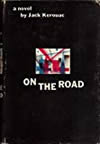 90. On the Road by Jack Kerouac (April 2022) [Book #169/306]
90. On the Road by Jack Kerouac (April 2022) [Book #169/306]
Also on the Observer list - As one of the seminal books of the Beat Generation, On the Road gets a sort of larger than life impression every time that I hear about it. Before I started the book I had thought it was a sort of autobiography/life lessons tale and that is sort of how it turned up after I read it. The book is essentially an autobiography, except with the names changed and, as far as I am aware, some of the circumstances adjusted for the narrative. The book essentially follows Sal Paradise in the first person role (standing in for Kerouac himself), along with the other prominent figure in the book, Dean Moriarty, standing in for his real life friend Neal Cassady. The narrative is broken up into 5 parts, each of which encompasses a unique cross country trip where Sal "just has to get away". Often times the trips are hitchhiking, bus travel, or driving a car into the dirt, and all of them are with Dean along with an assortment of other characters that come and go throughout the narrative. Taking place in the mid 1940's, post war, we are getting a different picture of America than we have today. Yes, things are cheaper, such as gas, but people are making much less and we see into the lives of those on the lower end of the socioeconomic spectrum. We live with them through the book and talk to them and really get a sense about who they are and what matters to them. That along with the prose, which is absolutely riveting, really draws you into the story. The style of the book is written based on a rambling, run-on letter that Kerouac once received from Cassady with the sentences sometimes going on and on, and other times being cut rather short. Ideas, themes, and questions are often brought up in the story and then immediately dropped, never to be answered or even acknowledged again. Kerouac's descriptions though, and his often poetic prose, makes this a beauty to read with bits and pieces of contemplative fiction and philosophy creeping in that is often profound in its take.
With all that being said, there is a major negative to the book. And that is that it's content is often homophobic, racist, misogynistic, pedophiliac, and probably lots of other negative adjectives that I can't think of at the moment. It's like these characters dive into these worlds of sex and drugs and are still able to pick out the negative stereotypes about everything. But it is weird, in that they "love" those stereotypes so it is a kind of "romanticized racism". With all of the gay characters in the book it is also super weird at how homophobic the book really is, however reading outside the book, I found out that Kerouac was rather a homophobe himself despite having almost all of his friends it seems in the LGTBQIA community. And although the book is often romanticized about it's "get out and see life" message, I see it as a tragedy, with the character of Dean slowly destroying his life through one method or another, and a character that could seriously have used medical and therapy intervention that could have perhaps helped with his constant downward spiral throughout the book. He gets to the point where he is often characterized as not being able to speak or make a sensical thought by the end of the book. If anything I see this book as a warning, and not necessarily a romantic adventure book. Overall, I would say that despite the beautiful prose, and the fantastic look at America in that time period, it is hard to recommend given all of the negatives throughout the plot and I would have to say unless you are really interested in reading it you could likely skip is and be fine.
91. The Godfather by Mario Puzo
92. The Clan Of The Cave Bear by Jean M Auel
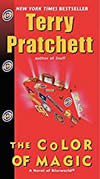 93. The Colour Of Magic by Terry Pratchett (February 2011) [Book #99/306]
93. The Colour Of Magic by Terry Pratchett (February 2011) [Book #99/306]
Also on My Book list - I started reading this book because I was looking for something easy to read and I noticed that all of the Terry Pratchett books were pretty cheap for the paperbacks so I picked up all 4 on the list. I was going to start with Mort until I realized that these were books all within a series of books called the Discworld series, and The Colour of Magic was book #1. It turns out that this is a fantasy series that takes place in a realm where the planet is a flat disk on the back of four elephants whom stand on a turtle. Other than that, something you may need to know is that magic is a major component of the story. But all in all, I really, really enjoyed it. His humor is a bit off, and not always what you would expect, which is what makes it even more enjoyable. The type of humor reminds me of Futurama in which, at one point the main character asks if anyone else tastes purple. That is the sort of thing you could expect from The Colour of Magic. The story in this book follows the exploits of a failed wizard and a tourist from a distant continent. I would actually really recommend this book, and likely this series which contains about 40 books, however I haven't read any further into the series as of yet. Although, now I personally will have to read them in order, even though the books on this list jump around a little bit. But for those who don't want to read all the books in order, the author has stated that the individual stories should stand on their own. Generally, I would probably recommend this book as the first one you read since it gives a pretty good introduction to the realm in which it takes place.
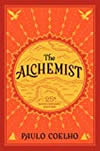 94. The Alchemist by Paulo Coelho (April 2023) [Book #177/306]
94. The Alchemist by Paulo Coelho (April 2023) [Book #177/306]
Also on My Book list - The Alchemist was actually something of surprise to me. I was expecting a dry historical tale, or something of the sort. However, what I was given was completely unexpected. This is essentially a folklore tale, told as if sitting around a campfire, about a kid who has been given a glimpse of a possible treasure in his future through his dreams and is told to pursue his dreams no matter what. What unfolds is a sheltered youth from Spain who experiences new cultures and new experiences as he transverses across the Sahara in pursuit of his dreams. Although the story does get a bit preachy in parts, it maintains a good balance of preachy to open-mindedness about what is out there and how all religions are different aspects of similar things. The story also emphasizes the reader to follow their dreams, despite hardships that may get in their way, and whatever obstacles may befall them. The path will be easy at the start, but as you get closer and closer to your dreams the path gets more and more difficult, with many opportunities to turn from the path, but if you keep going eventually your dreams can come true. It's a fairly uplifting and heartwarming tale and one that has a surprising bit of humor in it despite the negatives that befall the main character. Even as he gets disheartened at times he always finds himself in pursuit of his dream/ And there lies an analogy to the reader that as times get difficult, it just means you are getting closer to your dreams. This is a story that I can't help but recommend because not only is it short (a favorite feature of mine), it's fun and I could barely put it down.
95. Katherine by Anya Seton
96. Kane And Abel by Jeffrey Archer
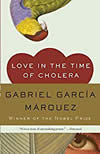 97. Love in the Time of Cholera by Gabriel Garcia Marquez (October-November 2007) [Book #65/306]
97. Love in the Time of Cholera by Gabriel Garcia Marquez (October-November 2007) [Book #65/306]
Also on the BBC and My Book lists - Contrary to the bizarre title this is a very good book. The title just signifies the time period that takes place and is not a the basis of the story. The book is a love story with a girl whose father tries to get her married above her station and two men who both fall for the girl. The one man is about the same level as the girl and he falls head over heals for her while the other man is a very prominent doctor who is the supreme bachelor in the community. The story starts off with the woman and the doctor as an old married couple then flashes back to the beginning of the story. It then slowly moves through the lives of these three people advancing a little on one character then falling back again with another character's story. Marquez does this phenomenally so that you do not even realize that the story changes from one character's narrative to another. The story is rather riveting and it kept me worried throughout the story about all the characters. There is no clear "good guy" or "bad guy" so I found myself cheering for both of them, worried that something major would go wrong. I would definitely recommend this for anyone in a romantic mood.
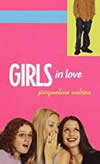 98. Girls In Love by Jacqueline Wilson (August - September 2012) [Book #112/306]
98. Girls In Love by Jacqueline Wilson (August - September 2012) [Book #112/306]
This is the third of the Jacqueline Wilson books that I have read on this list with only one left to go. After the first one which I recommended (The Story of Tracy Beaker) and a little bit of the same in the second book (Double Act) I am getting the feeling that all of Wilson's book follow the same formula. The book is about a thirteen year old (or so) girl who doesn't feel good about her self and has better looking friends who are all hooking up with boys but she can't. Therefore she must spend most of the story trying to find a boyfriend while not realizing the guy she already met isn't that bad. It's cutesy but that's about it. All of Wilson's stories seem to be about a girl with a problem (orphanage, ugly, dead parent, etc.) and places the reader in those situations while not always solving anything by the end of the book. Wilson's stories have become tired by the third time around and this book makes me loath having one more of her books to read.
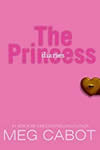 99. The Princess Diaries by Meg Cabot (January - February 2013) [Book #115/306]
99. The Princess Diaries by Meg Cabot (January - February 2013) [Book #115/306]
Also on My Book list - I was hesitant initially about The Princess Diaries because the last few children's books I have read on this list have really fallen flat for me (I'm looking at you Jacqueline Wilson). But I was pleasantly surprised by this one. The entire time reading it, I kept picturing Anne Hathaway, since she was the one who portrayed the princess in the movie, but I have never actually seen the movie myself. The premise of the book is that this high school freshman girl refuses to talk out her feelings, so she is told by her mother to keep a diary, which is what the reader is actually reading. Along the way she learns that she is actually a princess of this small country no one has ever heard of (because it is made up). Although it could have turned out bad, the story actually works. I found myself feeling for the characters and actually enjoying it. You want to root for the underdog (the best friend's brother) the entire time and you really believe that this is a story that could actually have taken place. This is one of the few books I have read with my daughter where I wanted to go find out what happens later (of which I could pick up the sequel books if I so chose). Overall, I liked the writing style and it is a rather fun book to read, I recommend it.
100. Midnight's Children by Salman Rushdie
Also on the Norwegian list -

